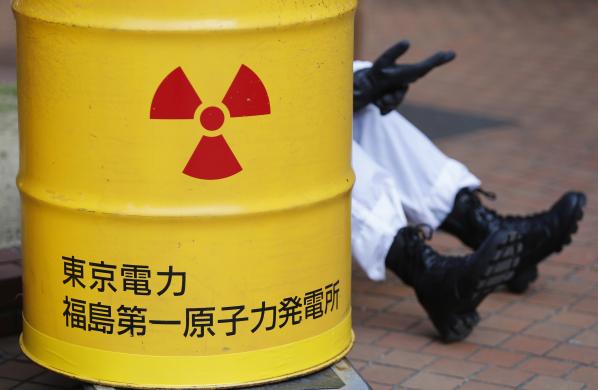U.S. to help in 'elimination' of sensitive Japanese nuclear stockpile
Date: 25-Mar-14
Country: NETHERLANDS
Author: Jeff Mason and Fredrik Dahl

An anti-nuclear protester wearing a protective suit is seen behind a
mock drum which is labelled as radioactive waste from Tokyo Electric
Power Co's (TEPCO) Fukushima nuclear power plant
Photo: Yuya Shino
Japan will turn over hundreds of kilograms (pounds) of sensitive nuclear material of potential use in bombs to the United States to be downgraded and disposed of, the two countries' leaders said as a nuclear security summit began on Monday.
China had voiced concern earlier this year about regional rival Japan's holding of plutonium but Washington and the United Nations nuclear agency have made it clear they are not worried about the way Tokyo is handling the issue.
Still, U.S. President Barack Obama and Japanese Prime Minister Shinzo Abe said that all highly enriched uranium (HEU) and separated plutonium would be removed from the Fast Critical Assembly at the Japan Atomic Energy Agency, a facility used for studying the nuclear physics of so-called fast reactors.
The announcement followed what the White House said were technological advances since the 1960s launch of this type of research plant that would allow it to be converted to run on fuel not potentially usable for bombs, unlike HEU or plutonium.
Japan, the world's only target of atomic bombs, during the final stages of World War Two, does not have nuclear weapons and has long said it will not seek to obtain them.
Like uranium, plutonium is used to fuel nuclear power plants and for research purposes, but can also serve as the fissile material for the core of a nuclear bomb.
"This effort involves the elimination of hundreds of kilograms of nuclear material, furthering our mutual goal of minimizing stocks of HEU and separated plutonium worldwide, which will help prevent unauthorized actors, criminals, or terrorists from acquiring such materials," said a joint U.S.-Japanese statement released by the White House.
"This material, once securely transported to the United States, will be sent to a secure facility and fully converted into less sensitive forms."
The announcement was made in The Hague shortly before leaders from 53 countries, including Obama and Abe, began a two-day summit aimed at agreeing steps to help prevent al Qaeda-style militant groups from obtaining nuclear bombs.
CHINA "EXTREMELY" CONCERNED
It is the third such summit since 2010, when it was held in Washington at Obama's initiative. Minimizing civilian uses of HEU or plutonium is regarded as vital to reducing the threat of nuclear terrorism. Although significant progress has been made in the last four years, more action is needed, experts say.
It is "well known that terrorist groups have been keen on acquiring nuclear weapons and materials," President Park Geun-Hye of South Korea, host of the second summit, said.
"A disaster along the lines of the Fukushima nuclear accident three years ago can also be wreaked by nuclear terrorism," she told fellow leaders, referring to the worst nuclear accident in a quarter of a century, in Japan in 2011.
Last month, China said it was "extremely concerned" by a report that Japan had resisted returning to the United States more than 300 kg (660 lb) of mostly weapons-grade plutonium.
Japan's Kyodo news agency at the time said the United States had pressed Japan to give back the nuclear material, which could be used to make up to 50 nuclear bombs. Japan had balked but finally relented to U.S. demands, Kyodo said. It was not clear why Tokyo might have been initially reluctant.
The material was bought for research purposes during the 1960s. A Japanese official said in mid-February that the two governments would probably reach an official agreement on its return at summit in The Hague.
China, which has nuclear arms, is involved in a bitter territorial dispute with Japan over some off-shore islands.
It denies Japanese accusations that it is a threat to peace and in turn has accused Japan of trying to rearm and failing to learn the lessons of its brutal behavior during World War Two, when imperial Japanese forces occupied China.
Chen Kai, secretary general of the China Arms Control and Nuclear Disarmament Association, said before the U.S.-Japanese announcement that Japan "in recent years" has been amassing a large amount nuclear material, including HEU and plutonium.
"Experts believe such Japanese stockpiling activities have far exceeded the normal necessity of its domestic use of nuclear energy," he told reporters on the sidelines of the summit.
"A BIG DEAL"
Japan also has plutonium contained in spent nuclear fuel at civil reactor and reprocessing sites, totaling 159 metric tonnes at the end of 2012, according to Japanese data on the website of the International Atomic Energy Agency (IAEA).
Abe said Japan would continue to make efforts to minimize nuclear material. "With regard to plutonium, we will firmly maintain our policy that we should possess no plutonium reserves without specified purposes," he told the summit.
A White House fact sheet said Japan's Fast Critical Assembly came online in 1967 when HEU and plutonium were believed to be required for the type of experiments it was designed for.
But recent technological progress has changed that and it will now become the world's first "major fast critical facility to convert from HEU and separated plutonium fuels, marking a significant milestone for global nuclear security," it said.
Miles Pomper, a nuclear security expert at the Monterey Institute of International Studies, said such critical assemblies had not been "touched" before.
"They usually have the most weapons-grade material so it's a big deal," he said in an email. "However, Japan still has nine tonnes of separated plutonium that can be used in nuclear weapons and is looking to make more."
(Editing by Mark Heinrich)
![]()
© Thomson Reuters 2014 All rights reserved